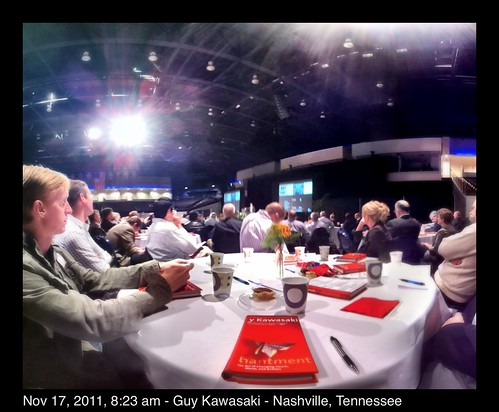Guy Kawasaki - Belmont Fall Leadership Breakfast
21 November 2011 05:17 PM CST
Last Thursday, November 17, I had the pleasure of attending a presentation by Guy Kawasaki. The presentation was part of the Belmont Fall Leadership Breakfast.

Guy Kawasaki is an influential figure in technology evangelism. He has spent two tours of duty at Apple and both times was responsible for maintaining the "Cult of Mac." His expertise lies in creating excitement and maintaining excitement for products and brands. In short, he is a marketing guru. Guy is also a venture capitalist and the author of over 10 books.
Guy's presentation was entitled, "The Art of the Start." Having recently dipped my toe in the entrepreneurial pond I was excited to hear his insights and advice. Here's a rough overview of some of the topics he discussed, as well as my thoughts.
- Make Meaning - starting a business is not about making money, it's about making meaning. If you can make meaning, you will inevitably make money. The best place to start is to figure out what benefits you can provide your customers.
- Make Mantra - in Guy's opinion most mission statements do nothing to define what it is a business does. A good place to start, for your sake, your employees sake, and your customer's sake, is to make a two or three word statement with regards to why your company exists.
- Get Going - there's no time like the present to start your business. There's a tremendous amount of cheap and/or free resources to get your business started. Make sure you find a business soulmate. Teams help balance all of the players out. And, when building your team, make sure you hire people at your level or higher. Finally, don't be afraid to polarize people - there will always be lovers and haters.
- Define a Business Model - I really enjoyed what Guy had to say on this topic. He said, "think of your customers as temporarily having your money in their pockets." Your business model should be specific and simple. Finally, when you've defined your model make sure you ask women about it. Women have a greater tendency to think objectively whereas men just want to kill their competition.
- Weave a Mat - when starting a business it is important to have milestones, assumptions, and tasks clearly defined.
- Niche Thyself - the best businesses provide a unique product or service that provides a high value to their customers.
- Follow the 10/20/30 Rule - Guy's presentation rule: 10 slides, 20 minutes, minimum of 30 point font. My personal jury is still out on this rule. I like lots of jazzy slides with minimal text.
- Hire Infected People - always hire people better than yourself and try to hire people you are enchanted by.
- Lower Barriers of Adoption - never ask anyone to do something you wouldn't do yourself. This rule applies to customers, employees, vendors, etc.
- Seed The Clouds - always enable test drives, find the influencers in your market, and be sure to take money no matter where it comes from. This was a great point - if an unanticipated market develops for your product or service make sure you embrace that market. After all, they're buying what you're selling.
- Don't Let The Bozos Grind You Down - there will always be doubters and haters. Do your best to take the advice you need and to ignore the rest.
Guy also recommended everyone in the room watch the Justin Bieber movie "Never Say Never." Strange advice, right? Well, according to Guy it is hands-down the best movie on modern day marketing he's ever seen. That was enough of an endorsement for me to drink the Kool Aid. I'll be looking for that movie next time I'm at a RedBox.
Another point Guy made really resonated with me. Kate O'Neill, a local entrepreneur here in Nashville, asked Guy for his perspective on how to develop a strong entrepreneurial and tech-centric startup community. His response? Focus on the engineering departments at the local universities. Engineering departments kick out a lot of great ideas and a lot of individuals capable of bringing those ideas to life. His opinion is that the engineering department at Stanford is a big reason for the overall success of Silicon Valley. I agree.
When asked about competition, Guy said that near death experiences are great. Further, when presenting your company to investors and/or customers always show a slide that highlights not only your strengths in comparison to the existing competition, but also where you are weak. Show what you can and cannot do, but most importantly, show what you can do well that your competition can't do.
Finally, when pressed on raising venture capital Guy bluntly advised that you should never raise VC money. It's a niche market for an extremely small number of companies. The most important thing you can concern yourself with is generating sales.

If you're interested in checking out a similar presentation, I found a video and accompanying slide deck for a similar "The Art of the Start" presentation Guy gave several years ago. See below for details: